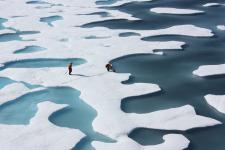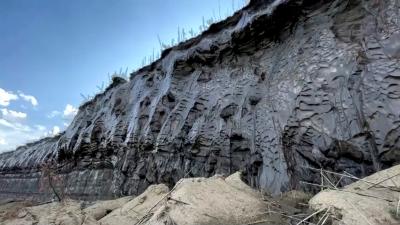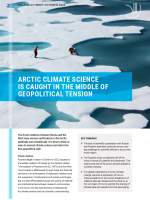Arctic climate science is caught in the middle of geopolitical tension

A Greenlandic translation is in the making.
Frozen science
Russia’s illegal invasion of Ukraine in 2022 caused an immediate isolation of Russia by the Western states. This isolation of Russia by the EU, NATO, and the West more broadly is effectuated through trade and financial sanctions, the minimization of diplomatic relations and the suspension of cultural and civil society exchanges. But it is also effectuated through the cutting of national and institutional ties between research communities. In the Arctic, this has had dramatic consequences for climate science and the scientific
■ The lack of scientific cooperation with Russia and Russian scientists continues to be a very big challenge for scientific efforts in and on the Arctic region.
■ The Russian Arctic constitutes half of the Arctic in terms of coastline and landmass. This means that half of the Arctic climate dataset is currently missing.
■ The global implications of Arctic climatic change warrants a discussion of how to make exceptions to the current breakdown of relations between Russia and the West or, at the very least, of how to exempt the sharing of climate data and results from this decoupling.
understanding of ecosystems, melting ice sheets, glaciers, sea ice and thawing permafrost. The Arctic climate and ecosystems directly affect a number of geophysical mechanisms with climatic ramifications across the globe. As a popular warning forbodes: What happens in the Arctic, does not stay in the Arctic.
Research institutions and cooperation between individual researchers have thus been directly affected by the interstate conflict between Russia and Ukraine. This division between ‘Russian’ science and that of the West cuts across disciplines and sub-fields and has serious consequences for natural sciences as well as social sciences and humanities. For climate research in the Arctic, this disrupts data collection, data processing and data sharing, as well as peer feedback, dialogue, and publication processes.
Most concretely, fieldwork in Russia has become impossible as most EU and NATO members have decided to suspend all research projects involving Russian institutions or taking place in Russia. The Russian Arctic constitutes approximately half of the Arctic in terms of coastline and landmass, and it is central to climate change research for a number of reasons. First, the extent and depth of permafrost across Siberia is by far the largest volume in any Arctic state. When permafrost thaws it releases carbon in the form of methane and carbon dioxide, which accelerates global warming. Permafrost thaw cannot be adequately measured by remote-sensing techniques like satellites, drones, or airplanes but must be monitored on and in the ground. Second, melting sea ice on the Russian shelf contributes to overall changes in the Arctic Ocean, and this has potential consequences for the global thermohaline circulation. The monitoring of such processes and the projection of their global ramifications are currently experiencing an irrecoverable gap. Put simply, half of the Arctic climate dataset is currently missing.

The freezing of scientific cooperation also has ramifications for the processing and sharing of data and the publication of scientific results. A number of large scientific projects and consortia, such as INTERACT, a circum-Arctic network of research stations funded by Horizon 2020, are completely reliant on data flowing across borders and between institutions. Such research collaboration, institutional as well as person-to-person, has been fostered since the end of the Cold War. The current halt to data and research sharing thus risks unravelling knowledge infrastructures that have been built over decades. In terms of scholarly debate, dissemination and publication of results, Russia’s war in Ukraine also carries with it serious consequences.
The Russian Ministry of Science and Higher Education has sought to ban Russian scientists from participating in international conferences and has announced an end to promotions based on the indexing of publications on Web of Science and Scopus. From the Western side, it has been argued that Russian scientists should be banned from publishing in international journals. The severing of relations is reciprocal, and it naturally also affects climate science in and on the Arctic. Moreover, it underlines the personal risks that Russian scientists run in continuing scientific collaboration or just informal, personal communications with Western counterparts – a fact that Western climate scientists express concern for, while taking care to maintain a minimum of contact.
The German-Russian research cooperation at the Samoylov Island research station in the Lena Delta (Siberia) is an example of climate science and cooperation coming to a halt.
This research station has been key to understanding permafrost thaw in Siberia since 1998 and hosts several long-term monitoring projects. With the German Federal Ministry of Education and Research’s decision to halt research cooperation with Russia, issued February 25, 2022, this data collection has essentially been “frozen and subjected to critical review”, in the words of the ministry.
The word ‘frozen’, of course, stands out in the context of Arctic climate research, and, with its double meaning, it underlines that a geopolitical freeze of relations between Russia and the West has dire consequences for the scientific efforts to understand just how dramatically the Arctic is ‘unfreezing’.
Exceptions and workarounds
The Arctic Council’s storyline since February 2022, as outlined in textbox 2, is indicative of a larger dilemma: Can and should scientific cooperation with Russia continue in light of its actions in Ukraine? And are there ways to continue research communication and data sharing in the current situation without undermining the coordinated signal that the Western sanctioning of Russia conveys?
There is no easy solution to this dilemma, and there is no easing of tensions between Russia and the West in sight. The decision to resume scientific cooperation is not in the hands of individual climate scientists. However, it is worth seeking inspiration from a number of existing exceptions to the general isolation of Russia, while also keeping in mind possible workarounds to alleviate some of the collapsed cooperation. While the isolation of Russia from the West is general and spans across societal sectors, notable exceptions to this isolation do exist:
■ Essential medical products may still be sold to Russia, and the EU has refrained from putting sanctions on Russia’s export of food and agricultural products to international markets in an effort to avoid harming food security in third countries.
■ Outer space cooperation between NASA, ESA and their Russian counterpart, Roscosmos, has been affected by the war in Ukraine, but cooperation in outer space, most notably at the International Space Station, continues to exist. NASA’s August 2023 live broadcast of what NASA termed a “Russian spacewalk”, during which two Roscosmos cosmonauts worked on a “European robotic arm”, indicates the continued cooperation with Russia in outer space.
■ Most relevant in the context of climate science, meteorological data, i.e., weather data used for forecasting, mostly continues to be shared between Russia and the West. While weather data in and around Ukraine is used operationally by both sides of the conflict, it seems that the global sharing of weather data takes priority. Considering the global consequences for populations, food production, transportation, infrastructure, contingency planning etc. that a breakdown in this global data sharing could have, it seems reasonable to exempt the sharing of meteorological data from the current impasse.
A week into the invasion, the Arctic Council was put on hold by the seven Western or allied Arctic states. With this, Canada, Finland, Iceland, the Kingdom of Denmark, Norway, Sweden, and the United States signaled to Russia that cooperation or communication could not continue as usual through the Arctic Council.
Through this joint statement, all levels of the Council, from the working group-level to meetings of the Senior Arctic Officials and the biennial Arctic Council Ministerial with participation from the Arctic secretaries of state, were officially suspended.
In a June 2022 statement, a partial resumption of activities took place. The seven allied Arctic states agreed to resume projects which did not have a direct or substantial Russian participation or leadership.
This partial resumption of working group activities is far from the usual running of the Council and its activities, considering that the political level is still officially on hold. Even though some projects have been resumed, the lack of scientific cooperation with Russia and Russian scientists continues to be a very big challenge for scientific efforts in and on the Arctic region.
Climate scientists working on the Arctic are already utilizing workarounds in an effort to maintain a minimum of contact. This can take the form of personal communication, non-institutional gateways, and perhaps meeting up in ‘neutral’ places and fora. However, given the size of the Arctic and the data volumes involved, the importance of understanding the melting cryosphere, and the already challenging conditions of conducting research in this part of the world, such workarounds provide little promise for future knowledge production on Arctic climate change and its global consequences.
The consideration of human health in Russia and food security in third countries, the effort to avoid exporting European geopolitical tensions to outer space, and the exemption of weather data all illustrate the possibility of making exceptions to geopolitics. These exceptions are rooted in different legal frameworks, logics and priorities, but they share some commonalities. In cases where the potential costs to populations are too high, and where the very basic information needed for a functioning society are at stake, exceptions can be made. Keeping in mind the importance for the entire globe of understanding the climatic changes and ecosystem degradation currently happening in the Arctic, it seems reasonable that climate science, or at the very least the sharing of climate data and results, also qualifies for such an exception.
DIIS Experts



